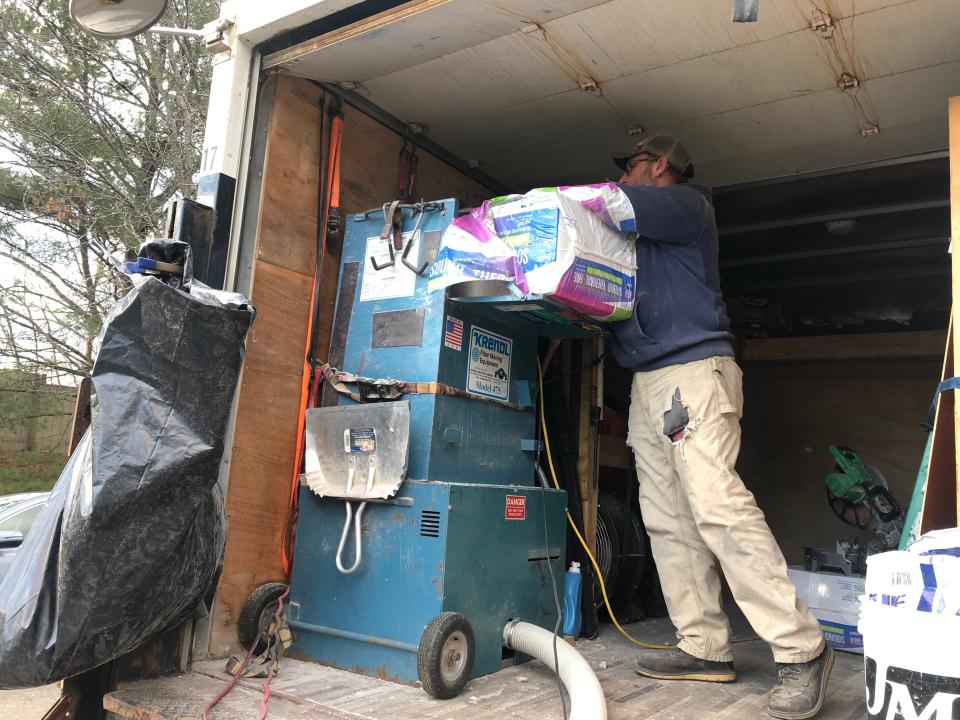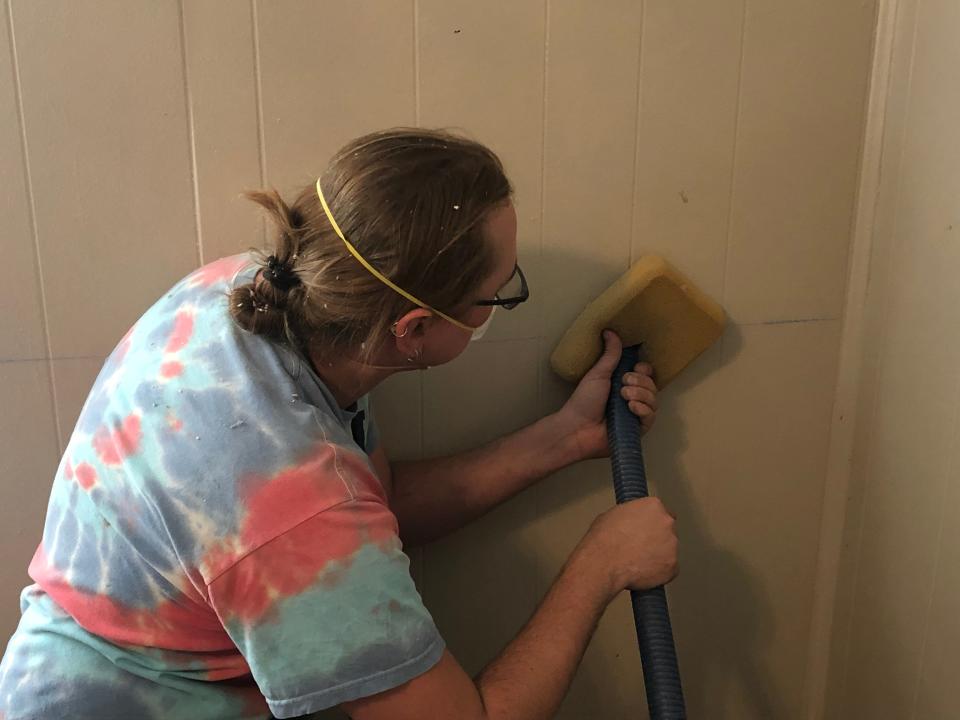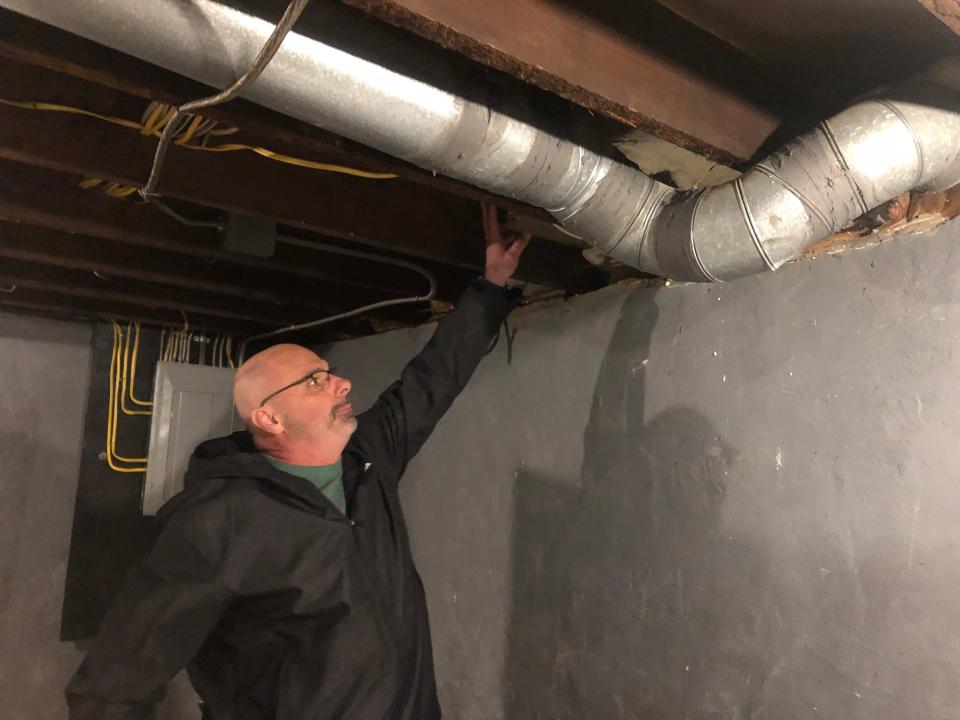As home heating bills increase, Southern Tier families may qualify for help: What to know
Living alone, with health issues, and on a fixed income, 75-year-old Donna Sheehan was worried about rising fuel costs ahead of the winter season, and feared she wouldn't be able to afford the heating bills for her Elmira home.
Then Sheehan got a postcard from the Economic Opportunity Program of Chemung & Schuyler Counties, advertising their home weatherization program.
On a lark, Sheehan applied, and found out she qualified. EOP paid for workers to install insulation in Sheehan's attic, replace the piping for the furnace in her basement, clean the furnace and all the vents, and fix a basement window, among other tasks.
"I was amazed, and it was a fluke that I did this," said Sheehan. "Never could I have afforded all this. I knew this was coming up and that my bill had jumped. I knew I had better do something. I was amazed at what they did for me."

Bracing for higher energy costs
The U.S. Energy Information Administration expects most U.S. households will pay more to heat their homes this winter.
Compared with last winter’s heating costs, the agency forecasts U.S. households will spend 28% more for natural gas, 27% more for heating oil, 10% more for electricity, and 5% more for propane.
On top of that, the National Oceanic and Atmospheric Administration expects the United States to experience a slightly colder winter than last year, leading to higher consumption of heating fuels.
Human service agencies anticipate the higher costs will increase hardships for families with limited income that are already dealing with higher prices for food and other necessities.
There are legal protections in place, and several programs available to help qualified residents pay for their increased utility costs, as well as help them cut down on energy usage.
State law provides protections for vulnerable utility customers
Under New York's Home Energy Fair Practices Act, a utility can't shut off service for non-payment until 35 days after the bill is due, a timeline that includes a 15-day shutoff notice.
From Nov. 1 through April 15, there are additional protections for heating customers.
Utilities must make direct contact by phone or in person with an adult in the household if a shutoff is pending. Heat cannot be shut off if the utility determines a customer might suffer a severe impairment to health as a result.
There is also a statutory moratorium on shutoffs every year for the two weeks beginning Christmas week and ending New Year’s week.
"If a consumer feels that the utility is treating them unfairly, they are encouraged to contact the PSC to have their concerns addressed," state Public Service Commission spokesman James Denn said.

Financial assistance available for Southern Tier residents
The primary resource available to help people pay their heating bills is the Home Energy Assistance Program, a federally-funded program administered in each county through the Department of Social Services.
The program applies to both qualified homeowners and renters, and can be used toward a resident’s electric, natural gas, oil, propane, wood or wood pellets, kerosene, or corn oil heating bills.
Given the anticipated jump in fuel prices, officials expect to see a corresponding increase in demand for assistance, along with some additional resources to help meet that demand.
"We do think there will be an increase in clients seeking help due to the increase in the cost of heating," said Jacqueline Canute, director of economic security with the Chemung County Department of Social Services, who said more than 6,000 households in the county got HEAP assistance last winter.
"There were some minor eligibility requirements to make it easier for applicant households that took place this year and the benefit levels did increase this year from last year," Canute said. "For example, the base benefit for fuel oil last year was $675 and this year it is $900."
HEAP eligibility guidelines are based on income, household size, primary heating source, and the presence of a household member who is under age 6, age 60 or older or permanently disabled.
Residents can learn more about eligibility by going to the state Office of Temporary and Disability Assistance website.
The period to apply for HEAP benefits opened Nov. 1 and will probably run at least through mid-March, Canute said.
Broome County officials are also bracing for an expected surge in demand for assistance.
"We do anticipate seeing an increase in HEAP applications this season. However, a far as we know, eligibility for this benefit has not changed," said Broome County Social Services Commissioner Nancy Williams.
"Individuals should contact their local DSS office to find out what benefits they may be eligible for, including emergency and regular HEAP benefits," Williams said. "211 is another good resource for those who are not eligible for HEAP."
Utilities do their part to ease the burden
Utility companies are aware of the hardships many of their customers will face this winter, and are urging people not to wait long to apply for assistance.
“With energy costs on the rise, we encourage our customers to look into all assistance programs available to them and to apply before the winter heating season really gets going,” said Terri VanBrooker, vice president of customer service for New York State Electric & Gas.
Additionally, major utilities voluntarily provide additional protections aimed at avoiding shutoffs during the heating season.
For example, in response to rising energy supply prices, NYSEG is waiving late payment charges for all customers from Dec. 1, through April 15, 2023.
NYSEG also offers deferred payment agreements for eligible customers.

Programs in place to help lower heating costs
In addition to help with paying heating bills, lower income homeowners can also take advantage of programs that can reduce those costs in the first place.
There are several agencies across the Southern Tier that provide free weatherization, furnace replacement, and other services to qualified individuals and families.
"We always have an increase in demand when the colder months come around and we do anticipate a higher demand due to the high fuel costs," said Nicole Howland, weatherization department director with the Economic Opportunity Program.
"However, we also anticipate additional funding to assist with those demands," Howland said.
While there are many services available that can improve home energy efficiency, getting anything done in time for this winter can be difficult.
"Every year at this time we will get a lot of calls," said Lisa Novitsky, program director for Community Progress Inc., which offers a variety of home improvement programs to eligible households throughout Chemung, Steuben, and Schuyler counties. "We have a long waiting list to get any services through agencies like ours."
Long waiting lists are also common at the Economic Opportunity Program and Tioga Opportunities, which offers energy and weatherization services to HEAP-eligible families in Broome and Tioga counties.
The good news is agencies can make allowances for emergency cases.
"The Tioga County waiting list is a year to two years. In Broome County, it's six weeks to a year," said Jim Wiser, director of energy services for Tioga Opportunities. "We are able to move people up the list if they have a heat emergency, such as a child or older person with health issues, etc. We coordinate with HEAP."
Sheehan, meanwhile, can't say enough good things about the programs available to help reduce heating costs for lower income residents.
"Everybody that can qualify should get this done," she said. "It cut my bill almost in half already."
How to find out more and apply for help
To determine eligibility for HEAP and other financial assistance, residents can contact their county department of social services, or go to mybenefits.ny.gov, or otda.ny.gov/programs/heap.
Residents who don't qualify for HEAP benefits might still be able to get some help. They can find out what programs they might be eligible for by calling 211 or going to helpme211.org.
New York residents who feel they are being unfairly treated by utility companies can contact the state Department of Public Service at 800-342-3377, or go to dps.ny.gov.
Here are some agencies that offer energy and weatherization services across the Southern Tier:
ACCORD: Provides weatherization programs for Allegany County residents. Call 585-268-7605, or go to accordcorp.org/housing-services.
ProAction: Offers programs for residents of Steuben and Yates counties. Call 607-776-2125, or go to proactioninc.org/heap.
Community Progress: Provides services for residents of Chemung (except City of Elmira), Steuben and Schuyler counties. Call 607-962-3506, or go to communityprogressinc.com.
Economic Opportunity Program: Serves residents in Chemung and Schuyler counties. Call 607-734-6174, or go to cseop.org/energy-services.
Tioga Opportunities: Offers programs for residents of Broome and Tioga counties. Call 607-687-4222, or go to tiogaopp.org/energy-weatherization.
Delaware Opportunities: Serves Delaware County residents. Call 607-746-1690, or go to delawareopportunities.org/weatherization.
Opportunities for Otsego: Offers services for residents of Chenango and Otsego counties. Call 607-433-8000, or go to ofoinc.org/find-program/weatherization.
Southern Tier residents can also find out what resources are available in their counties by calling 1-866-275-3427, or going to benefits.gov/benefit/1872.
Follow Jeff Murray on Twitter @SGJeffMurray. To get unlimited access to the latest news, please subscribe or activate your digital account today.
This article originally appeared on Binghamton Press & Sun-Bulletin: How Southern Tier families with high heating bills can get help

